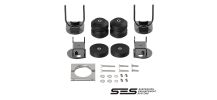Mastering trailer towing is a blend of skill, knowledge, and the right equipment. It begins with understanding the dynamics of towing – how the weight and size of your trailer affect your vehicle's handling. It's not just about the destination; it's about ensuring a safe journey there. The key lies in proactive preparation and adhering to towing best practices.
Rigid Hitch: Your Trusted Towing Companion
For those who take trailer towing seriously, Rigid Hitch Inc. is your go-to source for all towing essentials. As a dedicated manufacturer and distributor, we specialize in high-quality trailer hitches, towing accessories, trailer parts, and truck accessories. We understand that towing needs vary from light personal tasks to heavy-duty commercial jobs. That's why our products are designed to cater to a broad spectrum of requirements, ensuring reliability and durability, no matter the load or journey. With Rigid Hitch Inc., you're not just buying a product but gaining a partner in safe and efficient towing.
Verify Compatibility Between Your Vehicle and Trailer
Start by consulting your vehicle's owner's manual or contacting the manufacturer to determine its towing capacity. This capacity indicates the maximum weight your vehicle can safely tow. It's important to remember that exceeding this limit can put undue stress on your vehicle's engine, transmission, and braking system, potentially leading to breakdowns or accidents.
Once you know your vehicle's towing capacity, compare it to the loaded trailer's weight. This weight comprises not only the cargo but also the trailer itself. If the loaded trailer weight exceeds your vehicle's towing capacity, it's a clear sign that the two are incompatible. In such cases, choosing a different car with a higher towing capacity is advisable or opting for a smaller, lighter trailer.
Verifying compatibility between your vehicle and trailer is a fundamental step in trailer towing. It ensures that your towing setup is safe and prevents potential mishaps on the road. Always respect your vehicle's towing capacity to avoid compromising safety and performance.
Choose the Right Hitch and Towing Equipment
Different trailers may require different types of hitches, such as ball hitches, fifth-wheel hitches, or gooseneck hitches. To determine the right hitch for your towing setup, consider factors like the type and size of the trailer, your vehicle's towing capacity, and your intended use.
Ensure the selected hitch is installed correctly and securely fastened to your vehicle. It's advisable to seek professional installation or guidance to ensure the hitch is fitted correctly. A well-installed hitch enhances stability and safety during towing.
In addition to the hitch, invest in high-quality towing equipment, including safety chains, couplers, and weight distribution systems if needed. Quality equipment enhances safety and provides peace of mind during your towing journeys.
Check and Adjust Tire Pressure on Both Vehicle and Trailer
Proper tire pressure is a fundamental factor in safe trailer towing, regardless of whether you're an individual or a business transporting goods. Neglecting tire maintenance can lead to reduced stability, increased rolling resistance, and even tire blowouts, posing significant safety risks.
Before hitting the road, take the time to check and adjust the tire pressure on both your tow vehicle and the trailer. Start with your tow vehicle's tires, consulting the owner's manual or the tire manufacturer's recommendations for the correct pressure. Under-inflated tires can compromise your vehicle's handling and fuel efficiency.
Next, turn your attention to the trailer's tires. Ensure that they are also inflated to the recommended pressure. Remember that trailer tires may have different pressure requirements than your tow vehicle's tires, so consult the trailer's specifications or manufacturer guidelines.
Ensure Proper Loading and Weight Distribution
To start, balance the weight of your cargo evenly across the trailer's axles. This distribution prevents the trailer from becoming front-heavy or rear-heavy, which can lead to instability, sway, or even loss of control. Remember that the tongue weight, the downward force applied by the trailer on the hitch, should typically be around 60% of the trailer's total weight. Ensuring an appropriate tongue weight contributes to better control and maneuverability.
Avoid overloading the front or rear of the trailer, as it can compromise your vehicle's handling and braking capabilities. Distribute the load so that it remains evenly spread from side to side. Use quality tie-down straps, cargo nets, or other securement methods to prevent your cargo from shifting during transit. Always double-check the securement of your cargo to minimize the risk of loose items causing accidents on the road.
Regularly Inspect Hitch and Safety Chains
Start by visually inspecting your hitch before each towing journey. Look for signs of wear, damage, or corrosion. Check that all fasteners, bolts, and pins are securely tightened and in good condition. Ensure that the hitch ball or coupler is adequately lubricated to prevent binding.
Safety chains are another critical component of your towing setup. These chains serve as a secondary connection in case the primary hitch fails. Regularly inspect the safety chains to ensure they are free of damage, wear, or weak links. Verify that the chains are securely attached to both the trailer and the tow vehicle and have adequate slack to allow for turns but prevent dragging.
Perform these inspections diligently, and if you ever notice any issues with your hitch or safety chains, address them promptly. Repairs or replacements may be necessary to maintain the integrity of your towing setup.
Test All Lights and Signals Before Departure
Before embarking on your trailer towing journey, testing all lights and signals on both your tow vehicle and the trailer is crucial. Proper lighting keeps you safe and communicates your intentions to other drivers on the road. Testing your lights and signals should be a routine part of your pre-departure checklist, whether you're an individual or a business with a fleet of towing vehicles.
Begin by connecting your trailer to your tow vehicle and ensuring all electrical connections are secure and clean. This includes the plug/socket for lights and signals. Once everything is properly connected, turn on your tow vehicle's headlights and activate the turn signals, brake, tail, and hazard lights.
Check that all lights on the trailer are functioning correctly. Ensure that the turn signals are synchronized with those on your tow vehicle, and that the brake lights illuminate when you apply the brakes. Confirm that the tail lights are working, as they are crucial for visibility in low-light conditions. Remember to test the hazard lights, as they give other drivers an essential warning signal in emergencies.
Gear Up for Success with Rigid Hitch Inc.
Ready to tackle your next towing task with confidence? Visit Rigid Hitch Inc. for the best in trailer towing and towing accessories. Our extensive range of products is tailored to meet the needs of both individual and business clients, ensuring that you find the perfect fit for your specific towing requirements. From selecting the right hitch to choosing accessories that enhance safety and performance, our expert team is here to assist you every step of the way. Tow with assurance and let Rigid Hitch Inc. equip you for success on every trip!







